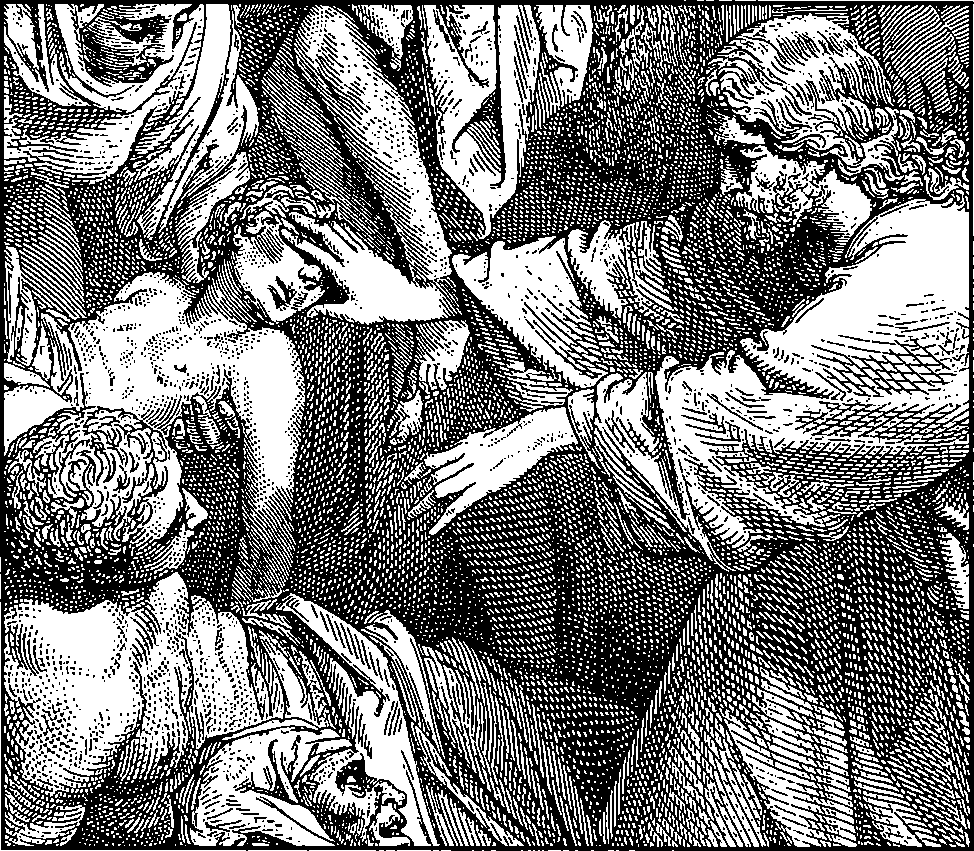Summer, Winter, and Sabbath (Matthew 24)
In the 24th chapter of Matthew, which we call “Our Lord’s Great Prophecy” verses 20-22 read:
“But pray ye that your flight be not in the winter, neither on the Sabbath day: For then shall be great tribulation, such as was not since the beginning of the world to this time, no, nor ever shall be. And except those days should be shortened, there should no flesh be saved: but for the elect’s sake those days shall be shortened.”
What did Jesus mean? Why should the winter be such a perilous time? Why a reference to the Sabbath day? Surely he did not mean that these words were to be taken literally.
SUMMER AND WINTER
We find it interesting that the scriptures divide the year into summer and winter.
“While the earth remaineth, seedtime and harvest, cold and heat, summer and winter, day and night shall not cease” (Genesis 8:22).
“Thou hast set all the borders of the earth; thou hast made [margin: made them] summer and winter” (Psalm 74:17).
Seedtime was the winter season from about our October 1st to April 30th, and this was also the rainy season. The last rains fell in April and then came a time of ripening and harvesting the crops, that is “summer.” Summer began about our May 1st, ending about our September 30th. Weather was very predictable in Israel; many times the scriptures speak of the early and late rains. The early rain came at the beginning of winter, and the late rain at its close. Rain during the summer harvest season was extremely unlikely:
“As the snow in summer and as rain in harvest, so honor is not seemly for a fool” (Proverbs 26:11). For rain during the summer season would be an unusual climatic condition.
Now Jesus’ words in Matthew 24:20-22, and Song of Solomon 2:10-13, provide us with much information. It portrays our Lord coming for his bride to “Rise Up” from her sleep of death and come away. He says:
“My beloved spake, and said unto me, “Rise up, my love, my fair one, and come away. For, lo, the winter is past, the rain is over and gone; The flowers appear on the earth; the time of the singing of birds is come, and the voice of the turtle is heard in our land; The fig tree putteth forth her green figs, and the vines with the tender grape give a good smell. Arise, my love, my fair one, and come away.’ ”
Consider how this beautiful scripture portrays our Lord coming for his bride so that she might “Rise up” from her sleep of death and come away with him. Notice that “the winter is past, the rain is over and gone.” It is the beginning of summer, that is, the beginning of the first harvest. The vines have “tender” grapes, they are young and giving off a lovely fragrance … the blossoming vines are scenting the air.
Appropriately, the time when the Lord calls his sleeping saints to “Rise up” and come away with him is the beginning of summer, and extends to the end of the harvest, the vintage harvest at the end of summer, our September and October.
We also have the inter-locking image in this same scripture, that the “fig tree putteth forth her green figs.” We understand this to refer to Israel, emerging at the beginning of this first harvest with the raising of the sleeping saints.
After the final vintage harvest, winter comes. The grapes remaining have not been a part of the great vintage. They remain, and it is winter: “Then shall be great tribulation, such as was not since the beginning of the world to this time, no, nor ever shall be. And except those days should be shortened, there should no flesh be saved” (Matthew 24:21-22).
Antitypically, this is the period from the time of our Lord’s Second Advent, from when he called his sleeping saints to rise up and come away, through to the final vintage harvest. The final vintage harvest marks the end of the church’s earthly experience, the end of antitypical summer. It is before winter, and before the Great Tribulation.
GREAT COMPANY’S CRY
A very familiar scripture is: “The harvest is past, the summer is ended and we are not saved” (Jeremiah 8:20). It is the cry of the daughter of my people. We have understood that at some point the Great Company will know that the Church class has gone beyond the veil. First they realize their plight, but soon they will understand their mission and fulfill it, through Great Tribulation (Revelation 7:14). This is Winter Time.
Another scripture to consider furnishes more information: “The city of confusion [Babylon] is broken down: every house is shut up, that no man may come in. There is a crying for wine in the streets; all joy is darkened, the mirth of the land is gone. In the city is left desolation, and the gate is smitten with destruction. When thus it shall be in the midst of the land among the people, there shall be as the shaking of an olive tree, and as the gleaning grapes when the vintage is done” (Isaiah 24:10-13).
The time is plainly defined: there is no wine, that is, the New Covenant has not as yet been inaugurated, there is no joy in the land, Babylon is broken down, but the olive tree is shaken to remove the final fruitage. The scripture tells us that the vintage is done … the Olive tree [Sarah Covenant] is shaking to rid itself of its last fruit, but instead of olives, it is Grapes that are to be gleaned, still under the covenant, but not gathered in the vintage harvest!
Micah 7:1-7 is very relevant. Verse 1 is the cry of the Great Company when they first realize that the Church has completed her earthly journey. It reads: “Woe is me! For I am when they have gathered the summer fruits, as the grape gleanings of the harvest. There is no cluster to eat, my soul desireth the first ripe fruit.”
Verses 2 to 6 describe the deplorable and frightening conditions in the earth at this time, that is, the Winter. Finally, verse 7 gives us the turning of the Great Company to the task before them, and their complete trust in God for their salvation: “Therefore, I will look unto the Lord, I will wait for the God of my salvation, my God will hear me.”

Solomon, author of Song of Solomon
One more scripture relevant to the vintage harvest being taken before wintertime, is Revelation 14:14-16. This is the reaping of the harvest of the earth by Jesus. Here he is wearing a golden crown and thrusting in his sickle for the harvest of the earth – the vintage harvest. Then comes the reaping of the false vine. Please observe, the time sequence is consistent. The vintage harvest is taken before earth’s great tribulation – a wintertime. The Great Company is in the great tribulation. However, through their fidelity in the reaping of the false vine, they have their robes washed clean during this perilous period.
SABBATH REST OF FAITH
Now let us consider the Sabbath Day. What would be so terrible that Jesus would say, “Pray that your flight be not on the Sabbath day?” Why did he link the Sabbath day with wintertime? There are many Sabbaths: the Sabbath of the week, the Sabbath of the weeks (plural), the seventh thou sand year Sabbath … do any of these really fit the warning?
We have a clue in Colossians 2:16, 17: “Let no man, therefore, judge you in meat or drink, or in respect of a holy day, or of the new moon, or of the Sabbath days: Which are a shadow of things to come.”
In Hebrews 3, the Apostle Paul tells how God swore that Israel would not enter into his rest because of unbelief. In Hebrews 4:3 he says those who believe do enter into his rest. In verse 4, he likens this rest to God’s own rest on the 7th day of the great creative week. We clearly see that he is talking about the “rest of faith” which every consecrated follower of Christ experiences. This is the rest that was offered to Israel, but which they did not enter because of unbelief. This, too, cannot be the Sabbath about which Jesus warned, since this Sabbath is the rest of faith to every believer.
SABBATH REST FROM OUR OWN WORKS
But Paul also addresses, yet one additional Sabbath, when he writes (italics added for emphasis): There remaineth therefore a rest [margin: a keeping of Sabbath] to the people of God. For he that is entered into his rest, he also hath ceased from his own works, as God did from his. Let us labor therefore to enter into that rest, lest any man fall after the same example of unbelief” (Hebrews 4:9).
This verse shows another rest, another Sabbath! Note the words, “Let us labor therefore to enter into that rest,” and, “he that is entered into his rest, he also hath ceased from his own works, as God [did] from his.”
Is this not a companion scripture to Revelation 14:13? “Blessed are the dead which die in the Lord from hence forth: Yea, saith the Spirit, that they may rest from their labours; and their works do follow them.”
This is a promise to the Church of a rest beyond the vail! – a future rest. In Reprints 5071, Brother Russell says this: “There is still a further expansion of the Sabbath in its typical significance to the thousand year day. Then humanity will be at rest from Satan, from sin, from all the trials, besetments and difficulties of the present time, and all man kind will have an opportunity of entering into that rest but the church will enter first!”
It seems that when Jesus said, in Matthew 24:20-22: “Pray that your flight be not in winter, neither on the Sabbath day, for then shall be great tribulation such as never was since the beginning of the world to this time, no, nor ever shall be,” he was speaking of the period after the Church would have been taken in the vintage harvest at the end of summer, and would have entered into their rest, their Sabbath.
Those left after the end of the summer vintage, that is, in winter time, would face the great tribulation which Jesus speaks about immediately after the warning, saying, “for then …” Notice, “then” that is, after the winter and the Sabbath have come. Pray that your flight be before that time, but those “grapes” remaining are still his people, still under the Sarah Covenant. They will realize that they have a work to perform and if faithful, they will be mightily delivered!
– Bro. George Eldridge

Jesus, caring for others
